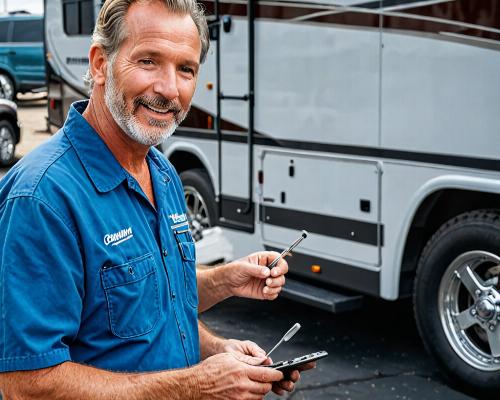Maintenance Tips
Regular maintenance is crucial for RV longevity and safety. We recommend:
- Annual Inspections: Complete system check before camping season
- Engine Service: Every 6 months or 5,000 miles (whichever comes first)
- Roof Inspection: Twice yearly, especially after winter storage
- Appliance Service: Annually or as needed based on usage
- Winterization: Essential before freezing temperatures
Heavy users or full-time RVers may need more frequent service. We can create a custom maintenance schedule based on your usage patterns.
Roof leak prevention is one of the most important aspects of RV maintenance:
- Regular Inspections: Check your roof every 3-6 months for cracks or damage
- Clean Gutters: Keep gutters and drains clear of debris
- Reseal Joints: Inspect and reseal around vents, antennas, and AC units annually
- Tree Avoidance: Be careful when parking under low branches
- Professional Inspection: Have your roof professionally inspected every 2-3 years
Early detection and repair of small issues can prevent major water damage and expensive repairs.
Proper winterization protects your RV's plumbing and systems from freeze damage:
- Drain Water System: Empty all tanks, lines, and the water heater
- Add Antifreeze: Use RV-safe antifreeze in all water lines
- Protect Appliances: Winterize ice makers, washing machines, and other water-using appliances
- Battery Care: Remove or maintain charge on batteries during storage
- Ventilation: Ensure proper air circulation to prevent moisture buildup
We offer professional winterization services to ensure the job is done correctly and completely.
Based on our 15+ years of experience, the most common RV issues include:
- Water Leaks: Usually from roof, windows, or plumbing connections
- Electrical Problems: Battery issues, converter problems, or wiring faults
- Slide-Out Issues: Mechanical problems or seal failures
- Appliance Failures: Refrigerators, furnaces, and water heaters
- Tire Problems: Blowouts, wear issues, or age-related failures
- Awning Problems: Fabric tears or mechanism failures
Regular maintenance and prompt attention to small issues can prevent most major problems.
